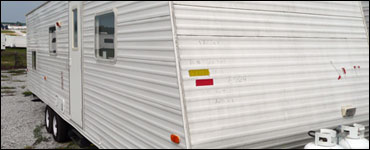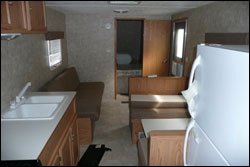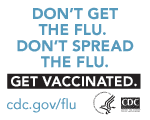CDC Features
Interim Findings on Air Quality in FEMA-Supplied Mobile Trailers

After Hurricane Katrina, the Federal Emergency Management Agency (FEMA) provided mobile homes and travel trailers to Gulf Coast residents who had lost their homes. Concerns have surfaced about air quality in the mobile homes and trailers. CDC is working with FEMA to investigate these health concerns.
From December 21, 2007, to January 23, 2008, CDC conducted testing to assess levels of formaldehyde in occupied FEMA-supplied travel trailers and mobile homes in Louisiana and Mississippi. CDC randomly selected 519 trailers and mobile homes for testing. These 519 trailers and mobile homes represent a cross-section of the trailer types and manufacturers most frequently used by FEMA in the Gulf Coast. These results represent only those trailers and mobile homes.
CDC has done an interim analysis of the data from the testing and has identified findings with significant implications for public health. It is important to note that, as interim findings, these are subject to change as analysis is completed.
Key Findings

• In many trailers, mobile homes, and park models tested, formaldehyde levels were elevated relative to typical levels of US indoor exposure.
• Average levels of formaldehyde in all units was about 77 parts per billion (ppb). This level is higher than US background levels. Levels measured ranged from 3 ppb to 590 ppb.
• These measured levels are likely to under-represent long-term exposures since formaldehyde levels tend to be higher in newer travel trailers and mobile homes and during warmer weather.
• Indoor temperature was a significant factor for formaldehyde levels in this study independent of trailer make or model.
• Formaldehyde levels varied by model (mobile homes, park homes, and travel trailers), but all types of trailers tested had some high levels.
• At the levels seen in many trailers, health could be affected.
Recommendations
• Families who live in FEMA-supplied travel trailers and mobile homes should spend as much time outdoors in fresh air as possible.
• Open windows as much as possible to let in fresh air.
• Try to maintain the temperature inside travel trailers and mobile homes at the lowest comfortable level.
• Do not smoke, and especially do not smoke indoors.
• If you have health concerns, see a doctor or another medical professional.
• Families that include children, the elderly, and those with chronic diseases such as asthma should make a special effort to get as much fresh air as possible, and these families should make relocating to permanent housing a priority.
For More Information
• Interim Findings on Formaldehyde Levels in FEMA-Supplied Travel Trailers and Mobile Homes (![]() 21 pages, 278KB)
21 pages, 278KB)
• Protocol for Evaluation of Formaldehyde Levels in FEMA-Supplied Travel Trailers and Mobile Homes (![]() 36 pages, 596KB)
36 pages, 596KB)
• CDC News Releases and Press Conferences
• Federal Agency Invites Residents to Public Availability Sessions in Louisiana (![]() 2 pages, 38KB)
2 pages, 38KB)
• Federal Agency Invites Residents to Public Availability Sessions in Mississippi (![]() 2 pages, 36KB)
2 pages, 36KB)
• CDC Releases Results of Formaldehyde Level Tests, February 14, 2008
• Public Availability Sessions
• Sessions in Louisiana, February 25-28
• English (![]() 1 page, 318KB)
1 page, 318KB)
• Vietnamese (![]() 1 page, 2.7MB)
1 page, 2.7MB)
• Sessions in Mississippi, February 25-28
• English (![]() 1 page, 316KB)
1 page, 316KB)
• Vietnamese (![]() 1 page, 4.2MB)
1 page, 4.2MB)
• Information for Residents
• Indoor Air Quality Fact Sheet
• English (![]() 3201KB)
3201KB)
• Spanish (![]() 2458KB)
2458KB)
• Vietnamese (![]() 1947KB)
1947KB)
• Indoor Air Quality and Health in FEMA Temporary Housing for Trailer Residents
• English (![]() 3286KB)
3286KB)
• Spanish (![]() 3239KB)
3239KB)
• Vietnamese (![]() 3041KB)
3041KB)
• Trailer Testing
• English (![]() 2394KB)
2394KB)
• Spanish (![]() 2525KB)
2525KB)
• Information for Clinicians and Other Professionals
• Indoor Air Quality and Health in FEMA Temporary Housing for Healthcare Providers (![]() 831KB)
831KB)
• Information about Formaldehyde Reaction for Physicians: CDC Health Advisory
• Additional Information
• FEMA For the Record: FEMA Continues to Address Formaldehyde Concerns
• Call FEMA at 1-866-562-2381 (TTY 1-800-462-7585) if you have any questions about your trailer's air quality or formaldehyde
Page last updated: July 3, 2008
Content Source: National Center for Environmental Health
Content owner: National Center for Health Marketing
URL for this page: www.cdc.gov/Features/FEMAtrailersFindings


